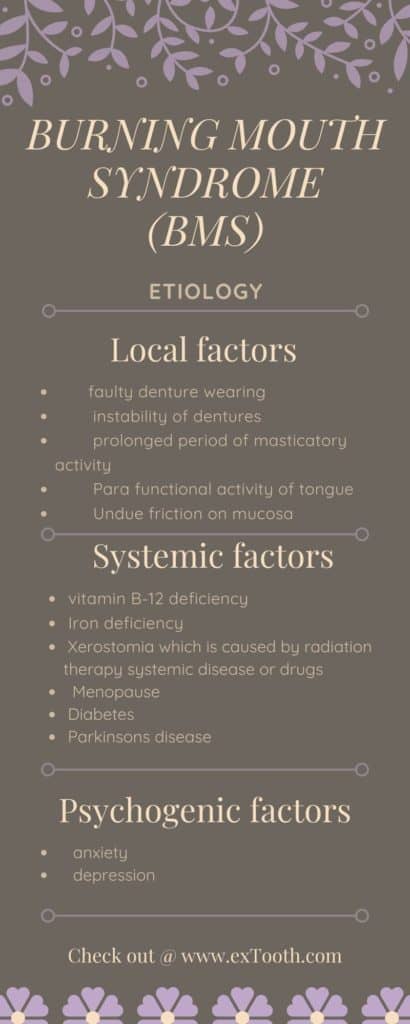Burning sensation in the mouth can be Burning Mouth Syndrome!
Putting a loose prosthesis in the oral cavity produces marked differences in the oral conditions that may have an opposite effect on the honesty of oral tissues. A mucosal reaction could result from mechanical irritation by dentures, accumulation of microbial plaque on dentures, & due to toxic or allergic reactions resulting from denture material.
The continuous wearing of denture may harm residual ridge morphology due to bone resorption. Further wearing of poorly functioning dentures that damage masticatory function could be an adverse constituent concerning the preservation of satisfactory muscle function and nutritional status with aging
Further environmental conditions influence plaque formation including saliva secretion rate, oral hygiene habits & denture wearing habits. Microbial plaque may have a substantial adverse effect.
BURNING MOUTH SYNDROME (BMS)
Burning mouth syndrome is a sequel of denture wearing and is characterized by burning sensation in one or the other oral structures in contact with dentures.
Etiology

Local factors
Allergy: Contact allergy from denture base material, especially monomer (liquid) of polymethyl methacrylate.
Trauma: Chronic trauma from denture or clasp
Habits: Destructive oral habits like clenching, grinding, or tongue trust can also be a causative factor for Burning Mouth syndrome.
Infection – Candida infection, especially in Diabetes, or immunocompromised individuals
Xerostomia or Dry Mouth: Lack of saliva is a cause for burning sensation of mouth. Dry mouth can be due to radiation therapy, certain drugs, and many other reasons. To know everything about xerostomia, read our blog.
Miscellaneous factors: Geographic tongue, jaw disorders, injury to the lingual nerve, etc
Systemic factors
Deficiency: Nutritional deficiencies causes a variety of disease. Also deficiency of Vit B complex, folic acid, iron causes Burning mouth syndrome.
Diabetes Mellitus: Diabetes causes Xerostomia, poor healing, and many more. It also causes Burning mouth Syndrome.
Psychological disorders: Anxiety, depression, and stress also cause burning mouth syndrome.
Endocrine disorders: Various endocrine diseases such as estrogen deficiency and hypothyroidism causes a burning sensation in the mouth.
Miscellaneous: Menopause, AIDS, Parkinson’s disease, and some medications.
Clinical features
1 BMS is different than burning mouth sensations; in the later group, oral mucosa is often are inflamed, maybe due to mechanical irritation, infection, or an allergic reaction. incase of BMS oral mucosa will be clinically healthy
2 The vast majority of people affected by BMS are older than 50 years
3 Common in postmenopausal women wearing complete dentures.
4 The patient complains of burning sensation in the supporting tissues or the tongue, particularly in association with the placement of new dentures.
5 The pain is gradual in onset in the morning and tends to become aggregated in the day with maximum intensity in the evening. There is associated with dry mouth and altered taste sensation.
Pain increases on having hot food items and with stress.
People usually present with waxing and waning pattern of pain lasting for many days. Pain gets stronger and weaker again with increasing intensity throughout the day.
6 Other symptoms include headache, insomnia, decreased libido, irritability or depression
Scaled mouth syndrome: The term is associated with people with burning mouth due to angiotensin-converting enzyme (ACE).
Management
A systemic approach is necessary to rule out the possible causes.
Every cause leading to a burning sensation must be killed. In case of any parafunctional habit, habit such as clenching, grinding should be regulated.
Nutrition supplements are to taken for deficiency.
Ferrous sulfate – 300mg thrice daily
Iron sulfate – 2.5 ml/day Intramuscular injection
Cyanocobalmin – 250mg/day
pyridoxine HCL – 25 to 100mg/day
Riboflavin – 10mg/day
Thiamin HCL – 5 to 30mg/day
Folic acid – 0.1 to 34mg/day
The counseling of the patient should be properly done to find out etiology and subsequent treatment.
Angela Giles
20 Jan 2020Thank you for this very informative article.
Elizabeth
20 Jan 2020Very informative!
Kaushal
22 Jan 2020Vary informative and useful. Farsali quiet like this informations thank you.
Kaushal
22 Jan 2020Vary informative and useful
thank you.
Jayasurya
14 May 2020Youth icon?
Ismayil yousaf
25 Aug 2020Thanks ,really very helpful
Could you pls put a video or blog on common clinical procedures (diagnosis and management) in a dental clinic. That would be very very helpful
Thank you
Rohit
16 Apr 2021Very cool